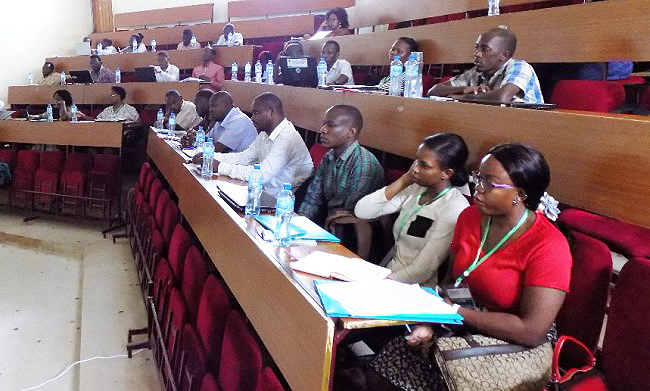The four day hands-on training on Good Health Research Practices (GHRP) funded by DAAD (the German Academic Exchange Service) came to a resounding end on Thursday, 21st February 2019 with participants admitting that they had been transformed for life. Officially opened by in-Country DAAD Office Representative, Mr. Steven Heimlich on Monday, 18th February 2019, the training was organized by the School of Health Sciences, College of Health Sciences (CHS), Makerere University in partnership with Heidelberg University and WHO /TDR, and facilitated by Heidelberg’s Dr. Pauline Grys and Jamila Nabieva. TDR is the World Health Organisation (WHO)’s Special Programme for Research and Training in Tropical Diseases.

“I have learnt that the planning stage is very important” testified a participant, “planning helps you to come up with mitigation measures; not that you will need them, but just in case you encounter challenges along the way” she added.
“Having come from a qualitative research background, it was interesting to see how the human sciences use theories to construct their arguments. This has been a good learning experience” remarked a male participant.

“I must give credit to the organisers for being able to bring together anthropologists, sociologists, engineers, pharmacists, philosophers, public health specialists and putting them in groups. This was a great choice of participants and we held very enriching discussions in our groups” remarked a male pathologist.
Speaking on behalf of the facilitators, Jamila Nabieva thanked all participants for the great patience exhibited during the all-day sessions and their various contributions. “We strongly believe in working in groups with peers and we thank Juliet (Dr. Kiguli) and Dr. Paul Kutyabami, the Chair Institutional Review Board (IRB) /Research Ethics Committee (REC) for organising and preparing all this” she added.

“I sincerely thank Dr. Pauline Grys and Jamila Nabieva for facilitating this training. Pauline and Jamila are quite popular and well respected in Germany for holding summer GHRP trainings” remarked Dr. Juliet Kiguli, the GHRP Uganda DAAD Alumni training organiser.
Dr. Kiguli further thanked the DAAD Regional Office in Nairobi and the DAAD in Uganda Office based at Makerere University for ensuring that the training takes place by availing the much-needed resources.

Earlier in the week, Dr. Kiguli and Dr. Grys paid a courtesy call on Mrs. Martha Loy Muwanguzi, Head International Office in the Office of the Vice Chancellor, who spoke highly of Makerere’s relationship with DAAD. “Mrs. Muwanguzi who hosted us at her office spoke about DAAD as a strong supporter of Higher Education in Uganda, especially the sciences” affirmed Dr. Kiguli.
Representing the Head, Department of Pharmacy – Dr. Pakoyo Fadhiru Kamba, Dr. Khalid Rajab thanked the IRB/REC Chair-Dr. Kutyabami, Ms. Stella Imot, Ms.Evelyne Katusiime and Dr. Kiguli for organising the training as well as DAAD for sponsoring the four-day event.

“I would most importantly like to thank our facilitators because we have all learnt a lot. I had initially thought that the training was all about ethics but I am happy that we have received a package consisting of both ethics and science” remarked Dr. Rajab, before quoting Sophocles – great tragedian of ancient Greece’s “Rather fail with honour than succeed by fraud”.
Concluding the day’s remarks, the Acting Dean School of Health Sciences, Prof. Charles Rwenyonyi Mugisha thanked all participants for taking part in the course and DAAD for availing the resources. He also thanked the Principal Prof. Charles Ibingira for supporting the School and the lecturers for drafting the proposal that led to DAAD’s sponsorship of the training.

“This training is the first of its kind in the history of the School of Health Sciences Institutional Review Board (IRB). It is not easy to commit yourselves for a whole week but I am sure that after today, you are all going to conduct research in a different way” said Prof. Rwenyonyi Mugisha.
He asked the facilitators to take time off to enjoy Uganda’s rich wildlife before returning to Germany and on a humorous note, promised to award each participant a non-graded certificate for in the health sciences, “no one fails”.

Article by Public Relations Office

 General1 week ago
General1 week ago
 Natural Sciences2 weeks ago
Natural Sciences2 weeks ago
 Agriculture & Environment1 week ago
Agriculture & Environment1 week ago
 Health2 weeks ago
Health2 weeks ago
 Health2 weeks ago
Health2 weeks ago










